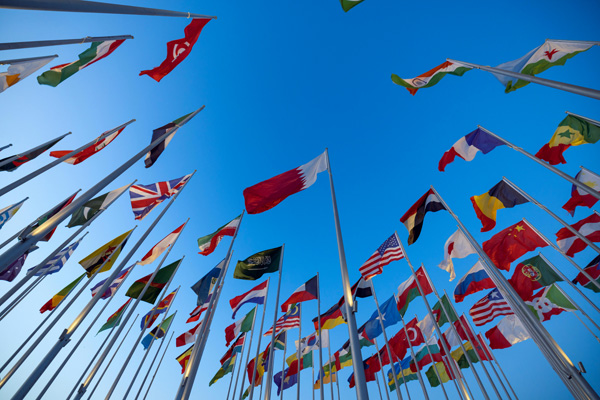U.S. addresses North Korea’s human rights concerns

[Collection of flags, Photo Credit to Pexels]
On May 20, activists, diplomats, and North Korean refugees spoke at the U.N. General Assembly (UNGA) to testify regarding the ongoing crisis of Pyongyang’s human rights abuses.
The assembly occurred at the U.N. Headquarters in New York, where speakers linked to the DPRK’s human rights violations to global instability and the country’s development of nuclear weapons.
The gathering was the first of its kind held at the General Assembly to feature actual testimonies from escapees— two former North Korean citizens—who shared stories of oppression and held DPRK leader Kim Jong Un accountable.
Their testimonies were crucial, as they helped draw attention to victims of oppression, especially encouraging others who are afraid to share their stories with the public.
The year’s gathering of the General Assembly and the attendance of the North Korean speakers carried deep symbolic significance—one that can garner global awareness and attention.
The conference was organized by the President of the General Assembly, Philemon Yang, who focused on current issues regarding human rights violations in North Korea.
In particular, North Korea’s increasing severity in restricting freedom of expression was actively discussed.
Examples of this crackdown include the Law on Rejecting Reactionary Thought and Culture, the Youth Education Guarantee Law, and the Pyongyang Cultural Language Protection Act, all of which have been implemented recently.
These laws strictly penalize any interaction with foreign cultures, such as viewing and distributing foreign content.
The speakers’ testimonies provided crucial insight regarding the restrictions and their effects.
Kang Gyu-ri’s heartbreaking story of escaping North Korea in 2023 with her mother and aunt abroad on a small wooden boat exemplifies the extent of oppression in North Korea.
She further elaborated on her story, stating that authorities strictly prohibit citizens from viewing South Korean dramas, revealing that three of her friends were executed for violating this rule.
Although similar testimonies and statements have existed for a long time, conditions in North Korea have improved, if anything, they have gotten worse.
Efforts to improve human rights in North Korea have been facing setbacks in recent years, due to the pandemic.
Since North Korea closed its borders at the beginning of the COVID-19 pandemic in January 2020, Pyongyang has used the isolation to enact brutal laws restricting access to information from the outside world.
Other human rights issues were also discussed, such as North Korea’s recent decision to send troops to Russia.
This act of military cooperation was identified as a new form of modern slavery, with one of DPRK defector, Kim Eun Joo, claiming that the soldiers “have no idea where they are, whom they are fighting against or why.”
Kim further added that “Their lives have become a means for the Kim Jong Un regime to make money.”
Up to 15,000 North Korean military troops have been deployed to Russia, and around 600 of them have been killed, with another 4,100 injured.
Moreover, South Korea and the United States also have suspicions that North Korea is sending artillery and missiles to Russia to receive financial support and military technology in return.
The conference participants hope that these testimonies will work towards preventing the horrendous crimes and human rights abuses present in the DPRK and prevent further nuclear development.

- Jooha Roh / Grade 10
- Korea International School

![THE HERALD STUDENT REPORTERS [US]](/assets/images/logo_student_us.png)
![THE HERALD STUDENT REPORTERS [Canada]](/assets/images/logo_student_ca.png)
